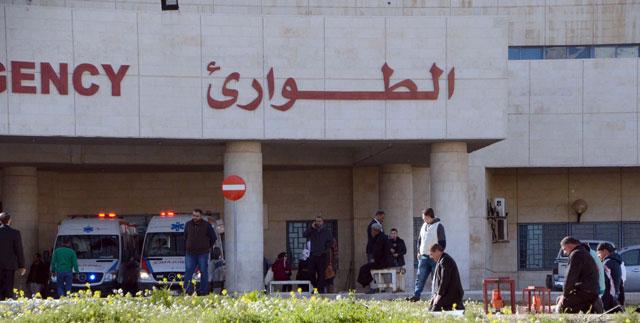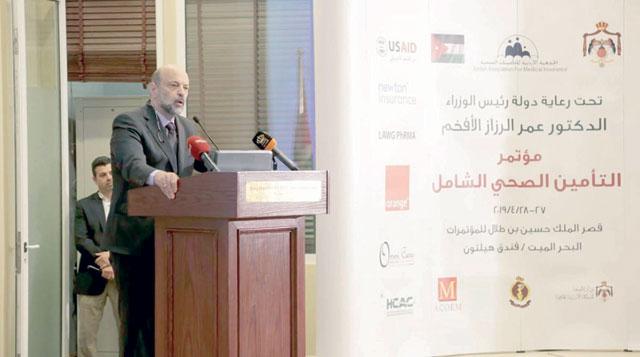You are here
Universal health coverage possible ‘when cost, quality, populism issues addressed’
By Dana Al Emam - Mar 03,2015 - Last updated at Mar 03,2015

AMMAN — The feasibility of implementing an inclusive health insurance system for Jordanians remains under study, as it entails further costs and need for cooperation among stakeholders, according to officials and experts.
Health Ministry Spokesperson Hatem Azrui estimated public, private, military and UNRWA health insurances to cover up to 87 per cent of Jordanians, a “high” percentage compared to the region.
Azrui added that the Cabinet committee, which was formed to study covering all Jordanians under the health insurance umbrella in December, is still considering several scenarios for comprehensive health insurance coverage.
“The issue under study is not easy as it entails deep examination of several financial, technical and administrative aspects,” he recently told The Jordan Times over the phone, adding that comprehensive health insurance, if applied, involves spending “large sums of money”.
Cost of health services
According to the Health Ministry's insurance director, Khalid Abu Hudeib, the cost of medical treatment of those covered and not covered by health insurance in 2014 reached JD320 million.
In a statement sent to The Jordan Times upon its request, Abu Hudeib illustrated that the cost of treating insured patients of all categories and grades of medical insurance inside and outside the Kingdom was around JD112 million last year.
Meanwhile, the cost of treating patients not covered with health insurance, who received assistance from the Royal Court and the Prime Ministry over the same period, reached JD208 million.
These patients were referred to public, military and university hospitals across the Kingdom, as the Royal Court and the Prime Ministry are “committed” to assisting all citizens “according to available possibilities”.
Asked what it takes to put a comprehensive health insurance system that covers all Jordanians in place, Abu Hudeib said implementing the move requires a “political decision” and is expected to cost JD320 million to JD350 million annually.
Inclusive insurance under study
The official underlined a Cabinet decision to look into a suggestion to set up an inclusive “health insurance umbrella”.
The University of Jordan was assigned the task of conducting a study on the number of those not covered with health insurance, in addition to the cost of coverage.
“Work is still under way and once recommendations are made the ministry’s health insurance department will examine them,” he noted, adding that under the same Cabinet decision, the Planning Ministry was assigned to study funding options in case a decision was taken to go ahead with the project.
Commenting on the efficiency of a comprehensive health insurance system, former finance minister Mohammad Abu Hammour said many countries that implement inclusive health insurance programmes have started to limit insurance services, due to their high cost.
He highlighted the need for cooperation among all private, public and military stakeholders to take part in health insurance, calling for ending duplication of insurance, which occurs in the case of military retirees who work in the private sector and results in wasted medications.
Meanwhile, he noted that in the case of Jordan, the cost of universal health coverage will not be “very high” as the percentage of Jordanians above 6 and below 60 who are not covered with insurance is statistically low, let alone that these potential beneficiaries are less prone to illnesses.
Abu Hammour warned that the private sector might shift insurance burdens to the government if a comprehensive health insurance system is applied, a matter that will increase insurance costs.
However, he highlighted the role of the Social Security Law in providing health insurance to subscribers, calling on private and public institutions to develop effective health coverage programmes.
Covering all Jordanians under a health insurance umbrella would be a “pioneering and reformative step”, as health and education expenses are “main contributors to poverty”, said Deputy Raed Hijazeen, head of the Lower House’s Health and Environment Committee.
“All different types of civil and military health insurances should be united under a single insurance fund,” he told The Jordan Times, adding that such a move “will ensure more social justice and minimise favouritism”.
Quality of medical services
According to Hashem Abu Hassan, president of the Jordan Medical Association, “justice” in the field of healthcare can only be achieved through “elevating the level of medical services to ensure quality for all beneficiaries from all walks of life”.
He noted that quality health services should not be a privilege exclusive to the well off, noting that citizens from the middle and working class receive treatment at public hospitals.
“We should not rush to announce huge slogans like universal health insurance without making sure that excellent health services are available for everyone,” he said, adding that the priority should be given to increase the Health Ministry’s budget and to provide the public health sector with qualified staff and effective equipment.
“It is a big step that should be taken gradually by increasing the segments included in health insurance, without affecting the quality or increasing the cost of the services,” he said, adding that those below 6 and above 60 are exempted from medical treatment fees as well as patients of contagious diseases and cancer.
Personal benefits
Meanwhile, some members of Parliament seek to increase their popularity and the public’s support by obtaining medical care assistance from the government to their constituencies.
MP Hijazeen acknowledged that lawmakers seek popularity through securing medical treatment to uninsured citizens, “but they will not oppose a decision that serves everybody”, he said.
Related Articles
AMMAN — Healthcare spending in the Kingdom is “wasteful” considering the unsatisfactory coverage and the fact that Jordan has a young popula
Health sector representatives said achieving targets set in the health component of the Jordan 2025 10-year blueprint requires amending related legislation, building capacity of workers in the field and streamlining health insurance institutions.
AMMAN — Only 74 per cent of Jordanians are covered by one type of health insurance, and there should be a mechanism to expand coverage, a So
















